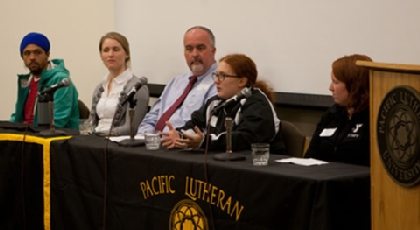Page 8 • (3,297 results in 0.027 seconds)
-
which it was created, and whether or not the source is relevant to their work. In the eyes of students, however, most sources are created alike and their relevance is determined by whether or not they are academic or scholarly. Although the process of learning from sources will vary from person to person and from situation to situation, situating a source of information within a certain context and disciplinary practice can provide the student a lens through which they’ll be able to see their own
-

October 28, 2011 A passion for learning is explored By Chris Albert The route to being an educator may vary, but a key ingredient is being passionate about being a life-long learner. It’s a sentiment the panel of current educators and PLU alumni shared with students during the Career Connections in Education discussion in October. A panel of PLU alumni share their experiences with current students about life as educators. “You have to have that whole idea that you’re going to be a life-long
-
September 5, 2013 https://www.youtube.com/watch?v=wg0AIF4hW6o Learning to Brew By Chris Albert The summer after graduating, Ken Thoburn ’09 hung out at backyard BBQs, sipping on home brews he and his friends had made. Everyone kept saying, “Guys, you should start a brewery,” Thoburn recalled. That’s when the Chinese Studies major and some friends, who also had recently graduated from local colleges—and also had not planned on selling beer—took their backyard beverages to brand-new heights
-
Choosing Online LearningThere are many reasons you might choose online or blended courses at Pacific Lutheran University. Online summer courses provide a PLU learning experience at a distance, and many options meet general education requirements. Online undergraduate, graduate, and continuing education courses provide more flexibility for scheduling. In a blended course, students have increased control over the time, place, pace, and path to achieving learning objectives. Although the style of
-
Guidelines for Blended and Online Learning (pdf) view download
-
Learning Outcomes at PLU - Majors and Academic ProgramsLearning Outcomes at PLU are designed to provide students with a clear outline of the key concepts, ideas, and skills they should learn during their time of study. Students in each degree program should have a firm understanding of these outcomes upon completion of their course of study. Learning Outcomes also provide an opportunity for programs to clearly communicate those values they feel are most important for students within the program
-
Experiential Learning Requirement Enrolling in the Experiential Learning Course Enrolling in any one of these courses obtaining a registration override from the instructor of the course and completing your registration via Banner Self Service. Students must be able to meet at the designated time (if any) as noted in the class registration schedule. 495 Internship A practicum experience in the community in the clinical, social, and/or experimental areas. Classroom focus on case
-
Create an Online Lesson for some advice on how to use Lessons pages. Consider using a Q&A forum in Sakai where students can post questions they think of while studying independently. Instructors can subscribe to the Forum and receive notifications when a new question is posted. Encourage students to answer each other’s questions (bonus participation points?). This will cut down on the number of individual questions you have to answer, and it creates a community of learning where students are active
-
Teaching and Learning with Archives and Special Collections The Archives and Special Collections partners with teaching faculty to develop instructional opportunities that enhance the student learning experience through the investigation and use of primary source material. The Archives and Special Collections teaching and learning services include: Consultations with instructors about possible assignments and lessons using primary sources and special collections materials. Guided discussions
-
Measurement of Student LearningThe resources for this section offer strategies for measuring student learning in an individual classroom and/or across multiple courses in a program.Assessing Significant LearningClick here to viewFormative & Summative AssessmentClick here to viewLearning Assessment TechniquesClick here to viewThe below quick links will direct you to other PLU or external websites. Right click to open links in a new tab or use the browser back arrow to return to the Assessment
Do you have any feedback for us? If so, feel free to use our Feedback Form.


